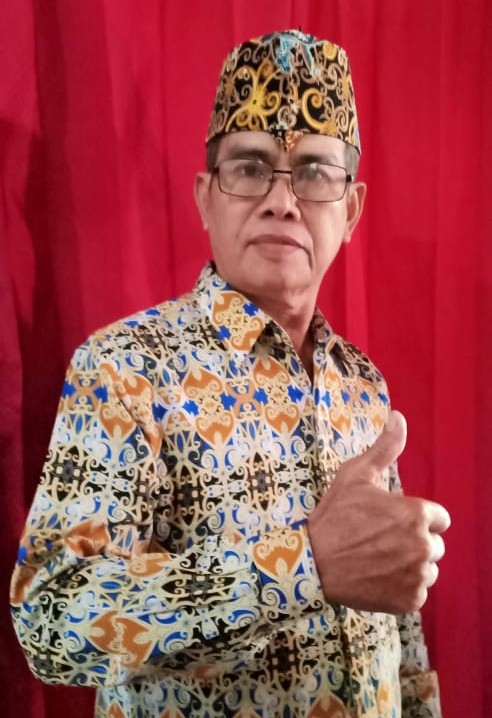… functions as the foundation’s highest authority in Indonesia, entrusted with all strategic decision-making responsibilities. Members of the Board of Trustees are appointed for life and may tender their resignation at any time.
Ibu Yansie, Member Bapak Hernika Rasan, Chairman Ibu Sharon, Member

Bapak Peritno I. Dasar
The Executive Board, also referred to as the Board of Directors, oversees the foundation’s day-to-day operations and implements executive decisions in alignment with its vision, goals, and programs. Members of the Executive Board are elected by the Board of Trustees for a five-year term and are accountable to the Board of Trustees.
Bapak Dorius, Secretary Bapak Thomas Brönnimann, President Ibu Agnes Novi, Treasurer
In the Dayak Ngaju language, “HAPAKAT” means “agreement,” “consensus,” or “deliberation.” It embodies the cultural practice of communal decision-making through discussion to reach a mutual understanding. This principle is integral to the Ngaju Dayak community, emphasizing collective harmony and democratic values. Traditionally, “HAPAKAT” was associated with collaborative efforts in activities such as land clearing for farming, highlighting the community’s emphasis on cooperation and mutual support.
“ECO” refers to two areas: ecology and economy. Social development programs are useless if they are not both economically and ecologically sustainable. Therefore, we pursue a holistic approach to help marginalized people in our community.
ECO HAPAKAT is a social non-profit organization based on Christian principles, yet strictly non-denominational. We support, encourage, and accompany people and communities regardless of ethnic, religious, social, cultural, or economic criteria. We believe that Almighty God loves all people equally.
Since the founding of the Eco Hapakat Foundation, our focus has been on the indigenous tribes of the Dayak and Punan, the native peoples of Borneo. Accordingly, a word from one of the largest language groups carries the main message in the name of the foundation.
However, this does not limit the foundation’s scope to Borneo. The problems faced by many indigenous tribes in Indonesia are fundamentally identical, although adapted to the local context.
For this reason, the foundation does not only work in Borneo. In the past, we have also worked on projects in Sulawesi and Lombok, and more recently in West Timor.
In 2001, Berkat Siman, a Dayak from Pujion, and Swiss national Thomas Brönnimann founded the first foundation under the name Petak Danum Pambelom Foundation. Under this initiative, the first major project was conceived and planned: the Tumbang Lahang Village Forest Project. In collaboration with the International Tropical Timber Organization (ITTO), a concept was developed to demonstrate how the Indonesian government could provide the local indigenous population with legal access to forest use.
Although the project was successfully nominated, implementation could not proceed, as no investors could be found worldwide following the September 11, 2001 attacks, the Bali bombings in October 2002, and the resulting crisis of confidence.
In 2003, Berkat Siman unexpectedly passed away, and as a result, Thomas Brönnimann lost access to the foundation. Subsequently, Kaeter Lamey, a Dayak from Palangka Raya, Dr. Michel Gelbert, and Thomas Brönnimann, both from Switzerland, founded a new foundation under a new name.
The “Eco Hapakat Foundation” was established. The purpose and objectives remained more or less the same.
Illegal logging was one of the dominant issues at the beginning of this century. The use of natural resources under the old regime of President Suharto was neither sustainable nor subject to the mechanisms of a free market economy.
Indonesia’s young democracy faced a difficult task in rethinking the concepts of the old regime and replacing them with new, better, and fairer concepts. This process is still ongoing in many areas, and the legacy of a decades-long monopolized economy continues to weigh heavily on the vast archipelago.
Indonesia is familiar with the concept of concessions. The state fundamentally claims ownership of all natural resources. Anyone who wants to use these resources must apply for a concession from the government, whether for logging, mining, or plantations.
It goes without saying that this makes it almost impossible for small, rural communities to apply for a concession for the forest and natural resources surrounding their villages. The bureaucratic hurdles, as well as the associated costs and initial investments, make such an endeavor practically impossible. Access to large financial resources and strong lobbying in politics and administration are indispensable.
Unfortunately, various concepts and solutions proposed by the government have largely failed in the past decades. To this day, most indigenous groups are still far from simple, affordable, and feasible concepts for the legal use of natural resources within a reasonable time frame.
The lack of education and professionals on one hand, and the lack of finances and good relationships on the other hand, still prevent indigenous groups from finding viable ways to manage the natural resources near their villages themselves.
For this reason, we at the Eco Hapakat Foundation have chosen a dual approach:
First: We try to support education at the grassroots level, from kindergarten through primary school up to secondary school and with a special focus on non-formal vocational train, both, in remote villages as well as in urban areas. We hope to contribute to the growth of a new, better-educated generation.
Second: We aim to support indigenous communities by assisting the local government in providing birth certificates, marriage certificates, and identity cards to members of remote village communities, and registering them. Afterwards, we help establish workgroups and cooperatives in the villages.